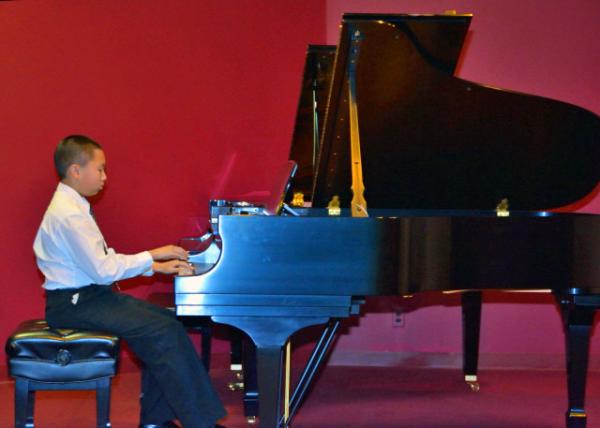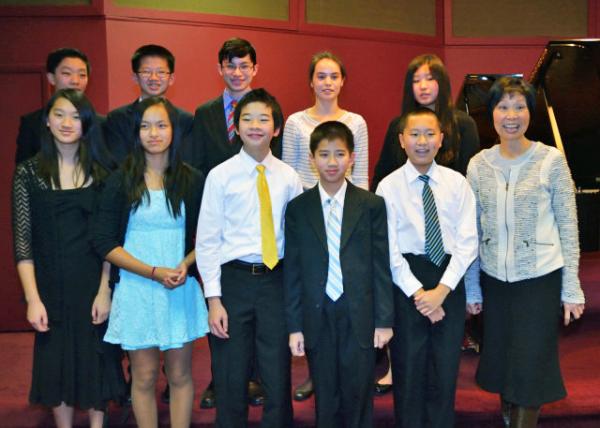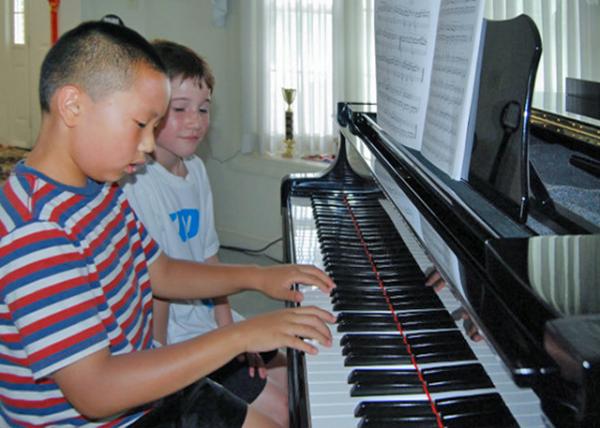2015-02-28 【Aiden in English】
My piano teacher, Lena Chen, hosts a recital at Jacobs Music in PA yearly. It's so that we students can hear other music and, even more importantly, practice before the massive event for me tomorrow. I've attended the USA's Golden Key Music Festival twice before, and the feeling is natural. The fest is a competition that places and evaluates players face-to-face, determining their skill by grading them. There are four award levels: gold, silver, Super Bronze (bronze), and Bronze Achievement. This performance would serve as a practice run for my audition tomorrow. My teacher always says that the product I produce today will be the same as the one I make tomorrow. I was suffocating in dress suits, waiting for my time to shine… and fail. I reviewed my piece again, thinking about each note and trying to calm my nerves. I played the Sonata in G Major, Op. 49, No. 2, 1st Movement by Beethoven. When my turn was up, I walked on stage, bowed, and sat down in front of the piano. It was a Steinway & Sons piano, the best kind there was. The one I practiced at home was a Yamaha, and they're two completely different things. Yamaha pianos are easier to play with soft and exact notes, while Steinway & Sons can have significant variations with the tiniest effort. As I readied my hands, these facts flew through my mind in a split second, considering the options on which way to play the best. Steinway & Sons pianos also took more effort to press down, which could be critical for my soft notes. I often made a mistake on these pianos when I played too gently, and no sound appeared from the piano, making the moment awkward, especially when it was the first note. This time, I was sure to play slightly harder on my first note to get the feel. A loud G major chord rang through the room as I pressed down. On the inside, I winced. I quickly adjusted, playing softer, and entered the rest of the piece as softly and slowly as possible. In general, the tempo is sped up when someone plays a loud note, and what I just did was no different. The speed increased enormously in the first measure, and I thought it was apparent. There were no problems for a long time, and I got into the rhythm. This wasn't like Beethoven's other pieces, where the notes were pounded from the piano. No, this was far from it and, in fact, quite the opposite. It was jolly and dandy, nothing too extreme—nice, lovely rhythm, but nothing too fast. I breezed through the first three pages and then crashed into a bump. This wasn't as obvious as the first one, so I learned after I was done when the teacher gave comments. The mood of the piece shifted, and a minor version of what it was before emerged. This part primarily focused on the scales. Up and down the keyboard, my right hand went. Soon, a chord appeared, and I rushed through it as if it wasn't there. Instead of holding three beats, my hands held one and then moved on. It sounded like the slightest hiccup that set my head ringing alarms. I let it pass at the time, but I knew I needed to do some last-minute practice. From now on, I'll want to practice, not negotiate with Mom to cut me some slack. "Thirty more minutes!" "No, Mom! Ten is long enough." "All right then, twenty it is!" "How about fi-" "Stop wasting time!" Usually, that last statement comes with a blast of annoyance from Mom. I'm just a typical Chinese mom if you ask me. So, there I was, playing the piece like nothing had happened, and the minor scales returned to a significant positive variation. This was followed by more scales and then the final chord. I bowed, smiling as best I could, although inside, that wasn't what I thought. Whatever product I produce today will be the same thing I do tomorrow. That's what I said. So now, let's rephrase it. Whatever product I produce today will likely be the same thing I do tomorrow. 【红霞译】
每年我的钢琴陈伦茜老师定期在宾州雅各布斯“后继者”音乐室举行音乐会,使得我们每一位学生都有机会在观摩同伴施展技艺的同时开拓音乐视野。关键在于,这场演出还是我明天参加重要活动之前最后一次实战练习。
以前我曾连续两次参加美国金钥匙音乐节,早已熟知其活动内容。音乐节采用比赛方式,对参赛选手的技巧水平进行一对一个别评判,并按照得分高低分出四个奖励名次:金奖、银奖、超级铜奖、成就铜奖,所以说今天的表演可被视为我明天比赛的一次预演,陈老师一直为我加油打气,只要努力终会收获成功。
西装革履全部行头武装在身,压得我透不过气来,前面等待自己的不是成功……便是失败。上台前,我默默地重温了一遍曲子,试图把握每个音符,这样心里感觉轻松一点,今天我带来的曲目是《贝多芬·G大调奏鸣曲作品第四十九号第二首第一乐章》。该出场了,我走上舞台,先向观众鞠躬示意,然后在琴旁坐好。眼前这台钢琴是雅各布斯音乐室质量最好的施坦威牌钢琴,跟我在家常弹的雅马哈牌钢琴算不上一路货。雅马哈音区清晰,擅长轻音弹奏,尤其适合表现单音;而施坦威则音质浑厚,弹什么都悦耳动听。
我抬手摆好姿势,脑海里飞速闪现两种钢琴的不同特点,以求最快最好地拿捏触键强度。施坦威钢琴需要用劲按键,无疑对弹奏轻音至关重要,我一直把握不好,该重的时候往往弹得过轻,以至于需要轻弹的地方,声音弱得听不出来,尤其是第一个音符,显得怪里怪气。正因如此,这回我稍微提高了第一个音的力度,可刚出手按键,G大调和弦立刻响彻整个演奏大厅,把吓我了一大跳,我赶紧降低音强,将后面剩余的部分尽可能弹得又轻又慢。一般情况下,琴声弹得越大,速度就会越快,对我也不例外。因此当意识到第一小节速度过快后,我努力调整音量,逐渐控制表演节奏。
与贝多芬其它充满激情的作品不同,这首G大调奏鸣曲既活泼华丽,出手不能过重;又柔和优雅,节奏不能过快。我追随作曲家流畅的旋律,一口气弹完三大篇乐谱,不料快要结束的时候因为大意而出了一点疏漏,失误很小,完全不及开头第一小节那么明显,要不是陈老师及时指点出来,恐怕连我自己都难以察觉。这部分音乐表情变化明显,由色彩明亮的大调和弦转换成温馨抒情的小调音阶,需要用右手沿键盘上下起伏。有一个和弦时值三拍,而我因操之过急,结果只完成两拍,最后一拍被忘得一干二净,听起来好像中间打了声嗝,感觉不太对劲。表演的时候我只能随它去了,但事后要抓及时间纠正这毛病。从现在起,我真得多加练习,不能再跟妈妈讨价还价。“再来卅分钟!”“不行,妈妈!最多十分钟。”“好吧,那就廿分钟!”“五…”“别再浪费时间!”通常妈妈说到这里懒得理会下面的答案,典型一位中国妈妈的做法。
我若无其事地继续弹奏全曲,从小调音阶回转到大调旋律,自然表现出更多音阶变化,最后以和弦结束整个表演。我鞠躬谢幕,尽量面带笑容,虽说并非真正发自内心。 “今天的努力终会收获明天的成功”,话是这么说,现在让我来重新组合一下语序,“今天的努力极有可能收获明天的成功”。
Today in History(历史上的今天): 2010: 名字的启示与寄托(Enlightenment & Repose from Names)  Sonata in G Major Op 49 #2 1st Mvt by Beethoven Sonata in G Major Op 49 #2 1st Mvt by Beethoven
(贝多芬《G大调奏鸣曲作品第四十九号第二首第一乐章》02-28-2015)  Piano Performers w/ Mrs. Solaiman Piano Performers w/ Mrs. Solaiman
(陈老师的演奏家 02-28-2015)  Practice @ Summer Break (夏练三伏 07-03-2011) Practice @ Summer Break (夏练三伏 07-03-2011)
Crosslinks(相关博文): 2010: 练琴的时候(When Playing Piano) 6th Grade(初中一年级)
|
